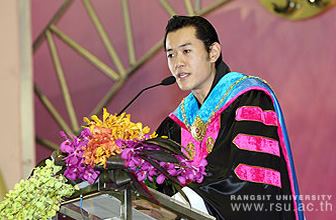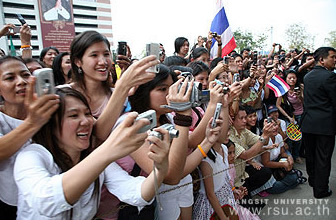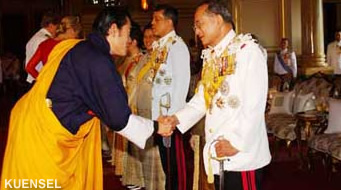| The
Crown Prince in Thailand |
 |
Bhutan Politics |
|
 |
Bhutan Politics |
 |
|
|
|
Crown
Prince's popularity in Thailand
|
 |
 |
| HRH speaking during the graduation ceremony at RSU |
| Bhutan's
26-year-old crown prince has become the latest heartthrob of women in Thailand.
His
Royal Highness the Trongsa Penlop Jigme Khesar Namgyel Wangchuck is more
popularly known as 'Jigme" amongst the Thais. The Crown Prince Jigme
Khesar Namgyel Wangchuck has appeared almost daily in local media, which
dubbed him "Prince Charming."
"He
is smart, modest and polite, and most importantly he is very good-looking,"
a 32-year-old government official, said. |
|
 |
| The Crown Prince is very popular in Thailand |
The
Thai media is full of reports about Bhutan's unique marker of national
progress of the Himalayan Kingdom Bhutan.
The
University also composed a special song entitled 'Precious Prince Of
Hearts" for the Crown Prince which was performed at the ceremony and
is to be included in the graduation bulletin.
The
prince "won hearts with grace, good manners." the Bangkok Post said. |
|
top
|
Learning
English with Bangkok Post: November 28 lessons
|
 |
Together,
the two stories make a very nice lesson. The show very clearly how the
English language describes an event from two different time perspectives.
You might also teach the lesson over two days, pretending the crown prince
is about to make his visit to the floral expo and then finding out what
happened on the next day.
Alternately,
you could divide the class into two parts, having one section of the class
read the "before" account and the second section read the "after " account.
When the students have finished reading their respective stories, focus
first on the flora expo. The first group could describe what was
expected to happen and what was scheduled to happen at the expo. The second
group could then detail what actually happened. Both groups could then
describe other information that was included in their stories.
Here
are some additional things you might want to point out or assign.
 |
HRH
Jigme Khesar Namgyel Wangchuck greets His Majesty King Bhumibol of Thailand
during the 60th anniversary celebration of the King Bhumibol Adulyadej's
accession to the Throne in Bangkok, Thailand
(June
2006) |
|
| November
24, 2006: The morning before the visit |
With
with this story, I would definitely point out the two contrasting ways
the writer describes the future. Where the events are likely to happen
but not completely certain, the writer uses present passive:
Bhutan's
Crown Prince Jigme Khesar Namgyel Wangchuck is expected to draw a huge
crowd of admirers...
Up
to 50,000 people are expected to turn up at the event to catch a glimpse
of the charming prince... |
|
Pol
Col Wirat Sumanaphan, head of the security and protection centre at the
floral expo, said the majority of visitors were expected to be there to
greet the Bhutanese crown prince at around 2pm.
Where
the events are scheduled and will definitely happen, or the sentence deals
with rules police have set up, the writer uses "will":
Well-wishers
will be allowed to welcome the crown prince on both sides of the path leading
into the expo. But the six areas of the park that Crown Prince Jigme is
due to visit, including the Royal Pavilion, the orchid garden and Bhutan's
national garden, will be off-limits to the public during his visit.
During
his visit to the expo, the crown prince will officially hand over to Thailand
Bhutan's ''Himalayan Garden of Peace''...
Arthit
Urairat, rector of Rangsit University, said the university will present
Crown Prince Jigme with an honorary doctorate on Feb 21 next year.
Notice
also there is one sentence using indirect speech that would have used "will"
had it been direct speech.
Pol
Col Sattakit Kornthong, deputy chief of Chiang Mai provincial police, said
full security measures would be in place with a 300-strong police force
assigned to the compound of the event.
November
25, 2006:
The day after the visit
Let's
use what I wrote in the main lesson as the basis of an activity:
When
you read this story, you will immediately notice that the tenses have changed.
What tense would you expect the story to mainly use? Read to see if you
are right. (You would expect that the main tense with be the simple
past and it is. Note that there is also an interesting use of the past
perfect: "She [Rattanaporn Suwakon] had been impressed by the polite and
modest manners of the prince". The clearly refers to a time in the more
distant past - to the crown prince's previous visit).
From
the first story you learned:
1.
A large crowd of admirers was expected to turn up at the flora expo to
try to catch a glimpse of the Crown Prince Jigme.
2.
Crown Prince Jigme was due to visit six areas of the park, including the
Royal Pavilion, the orchid garden and Bhutan's national garden.
3.
The crown prince was going to officially hand over to Thailand Bhutan's
''Himalayan Garden of Peace'', which was being exhibited alongside other
gardens from around the world.
As
you read the story below, look for evidence that the events above actually
occurred. Write the sentences which give the information.
1.
The whole province of Chiang Mai seemed to have reached fever pitch when
a huge crowd of people flocked to see Bhutan's Crown Prince Jigme Khesar
Namgyel Wangchuck who arrived in the northern province yesterday.
2.
The prince took a tour of the six areas of the expo, including the exposition
centre, the Royal Pavilion, the orchid garden, and Bhutan's national garden.
3.
The crown prince officially handed over to Thailand Bhutan's "Himalayan
Garden of Peace," which is being exhibited alongside other gardens from
around the world.
Where
else did the crown prince visit that was not mentioned in the first story?
(Wat Phra That Doi Suthep)
What
other information is included in the second story? Why do you think it
was included?
Information
from two ordinary people, Rattanaporn Suwakon and Nisarat Nilsawan, who
saw the crown prince plus a description of what an elderly woman did to
show her respect for the crown prince. This is "human interest" material
that helps give the reader a feel for the atmosphere surrounding the event.
 |
| Source:
Bangkok Post, Thailand, 2006 |
| December
14, 2006 |
 |
| His
Majesty King Jigme Singye Wangchuk said that the responsibilities of the
Throne would be delegated to the Chhoetse Penlop before 2008. His Royal
Highness Jigme Khesar Namgyel Wangchuck will be enthroned as the fifth
Druk Gyalpo in 2008. |
|
|
|
top
| Links |
 |
 |
 |
External
Links |
|







